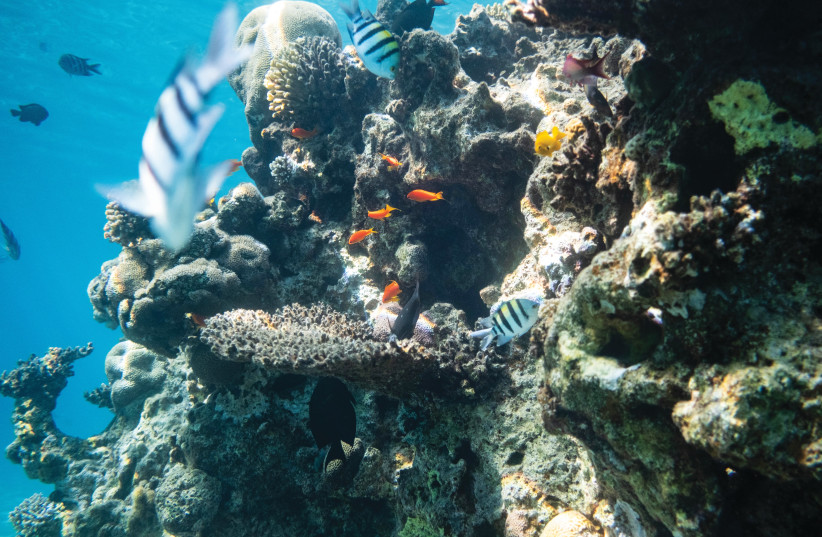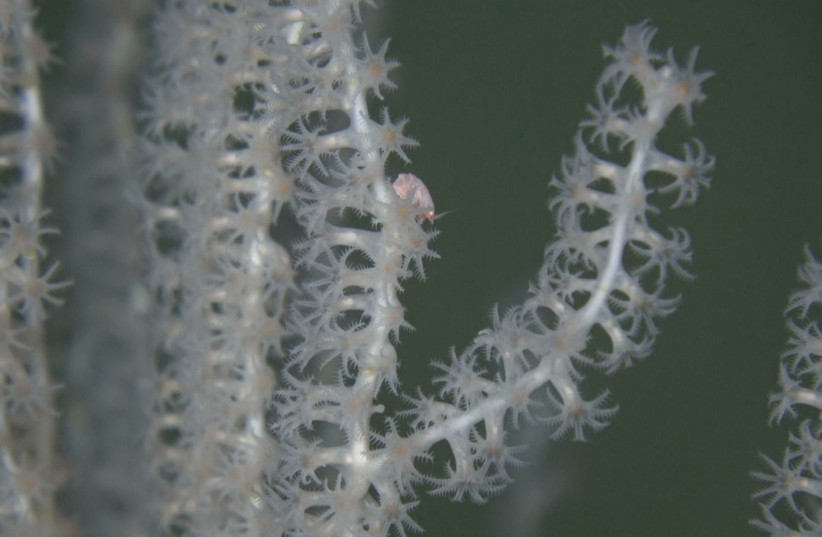With plastic, microplastic and shipping pollution, deep sea mining and plans for pipelines to Europe, action needs to be taken to ensure that human activity is done responsibly.
By JODIE COHEN

March 4 is a historic date. After 15 years of negotiations, the UN agreed on a plan to protect 30% of the world’s land and sea by 2030.
The oceans cover nearly half the planet. Sea that’s next to coastlines is governed by the neighboring countries’ exclusive economic zone; but sea that’s beyond 370km. from land (that’s 60% of the world’s oceans) doesn’t fall under any country’s jurisdiction, and the agreement deals specifically with these waters.
Why is this important? The ocean creates half the oxygen we breathe. It absorbs carbon dioxide, helping to limit global warming. The waters feed billions of people and provide livelihoods through fishing and tourism to millions more. But the seas are also threatened by climate change, pollution and over-fishing. Experts suggest that protecting 30% of the ocean will help to reverse negative ecological impacts, preserve fish, increase resilience to climate change, and secure long-term ocean health.
The new treaty will create marine-protected areas in 30% of the high seas by 2030. This means countries – including the coastline nation of Israel – will have to carry out environmental impact assessments for any planned activity in these areas. Israel is one of 73 members of the Global Ocean Alliance, which has been championing the 30×30 ocean target for a number of years.
Despite the country’s small size, Israel has two incredible sea wonders just off its coastline. I’ve written about one before – the beautiful but endangered coral reef in Eilat.
Marine life at the Palmahim Slide. (credit: University of Haifa and Israel Oceanographic and Limnological Research)
The other is the Palmahim Slide, a rare underwater geological formation, which is 1,000 square km. deep and 30 km. off the coast of Tel Aviv. With no access to sunlight, the Slide is home to coral gardens and rare creatures. It has been designated a biodiversity “hope spot” by Mission Blue, which has identified 144 global spots considered critical to the health of oceans. Exploring the Slide has been compared to exploring outer space in its potential for discoveries, and the Society for the Protection of Nature in Israel and the Nature and Parks Authority have been advocating for it to be a protected area.
It’s clear that Israel needs to take steps to protect these two gems. But with plastic, microplastic and shipping pollution, deep sea mining and plans for pipelines to Europe, action needs to be taken to ensure that human activity – which won’t stop – is done as responsibly as possible.
Preparedness is a priority
In March, the Environmental Protection Ministry carried out a drill to prepare for an emergency oil pollution incident on the coral reef in Eilat. In conjunction with the Nature and Parks Authority and Ecotion Association, the exercise simulated an oil leak from the Katsa terminal, where oil is transported and where there have been previous cases of pollution in the area.
As Rani Amir, director of the ministry’s Protection of the Marine Environment’s National Unit said, “As long as fossil fuels are used and the transportation of these fuels takes place at sea, an oil pollution event is not a question of ‘if’ but a question of ‘when’… We practice such incidents throughout the year… to be prepared to reduce possible hazards and to clean Israel’s beaches in the event of an emergency.”
“As long as fossil fuels are used and the transportation of these fuels takes place at sea, an oil pollution event is not a question of ‘if’ but a question of ‘when’… We practice such incidents throughout the year… to be prepared to reduce possible hazards and to clean Israel’s beaches in the event of an emergency.”Rani Amir
Innovations in shipping
Around the world, over 50,000 ships transport goods every year, burning more fossil fuels than all cars combined. Cleaner fuels for shipping aren’t currently considered cost effective, so making shipping more fuel efficient is key. For example, Marine Edge based in Haifa is developing technology to help ships minimize fuel consumption and carbon emissions. In October 2022, this innovation was awarded a Climate Solutions Prize by JNF Canada, KKL-JNF and Start-Up Nation Central.
Another Israeli company, NakAI, has developed an in-transit ship cleaning and inspecting robot to address the issue of biofouling – this is the build-up of microorganisms, plants, algae or small animals, causing mechanical deficiencies.
Biofouling can significantly increase ship fuel consumption, and regular hull cleaning is important to reduce carbon emissions. However, diver-operated services are expensive, and in-water hull cleaning isn’t available at all seaports. NakAI says its robot system resolves these challenges, reduces millions of tons of air and water pollutants, and protects aquatic species.
Protecting fish populations
Research by Tel Aviv University published in Nature Ecology & Evolution has highlighted that marine protected areas, some of which ban shipping and fishing entirely, are safe havens for the fish living inside them, but not for those living on their edge. So, increasing the amount of marine protected areas to the 30% target, compared to the original 10% that was thought to be sufficient, is important to effectively preserve fish populations.
Israel has also become a world leader in alternative protein development, which is helping to develop alternative sources of fish, and may eventually reduce fishing. Wanda Fish, for example, produces sustainable cell-cultured fish meat. It says it aims to let the world eat the fish fillets it craves, while giving the marine ecosystem time to rehabilitate. The company has developed an exclusive licensing and sponsored research agreement with Tufts University Prof. David Kaplan, a leading academic in cellular agriculture.
The threat of microplastics
Plastics and microplastics pollution is another threat to ocean biodiversity. According to a study by the Weizmann Institute, microplastic particles smaller than five millimeters, likely originating from plastic bags and other plastic waste dropped by the coast, can be carried by the wind for hours or even days, landing in the water hundreds of kilometers away. Marine life eats these particles, which we then ultimately consume when we eat fish.
Innovation is also playing its part here. For instance, the gamelike CleanCoin app encourages “players” to pick up rubbish, dispose of it responsibly and earn money while doing so. It’s only one year old but already has 100,000 users in Israel and is now looking to expand in Canada, the US, UK and Europe. The app is helping to make the world a cleaner place, prevent plastic and microplastic pollution in the ocean, and gives a whole new meaning to the saying that one man’s trash is another man’s treasure.
Measures like CleanCoin, and the Tel Aviv-Jaffa Municipality making its beaches single-use plastics free, are likely to be contributing to improving the situation. According to the ministry’s website, the Clean Coast Index data for February 2023 showed that 89.39% of the measured beaches were rated “clean” to “very clean.” This compared to 81.82% in the previous index, and 74% in the corresponding period of last year.
The high seas seem far away, and it’s hard to envision what we as individuals can do to help protect our oceans. However, minimizing our use of single-use plastics, recycling and, at the very least, throwing our trash away responsibly are small steps that can add up to a big difference. And while the 30×30 treaty text still needs to be formally adopted, it’s a positive sign, as it is the first international agreement to protect the oceans. I look forward to seeing how Israel will play its part.
The writer is Middle East Correspondent for India’s WION (World Is One) TV news channel. The author of Tikkun Olam: Israel vs COVID-19, she has helped numerous multinationals report on their contributions to tackling the UN’s Sustainable Development Goals. On Twitter: @JodieCohen613

